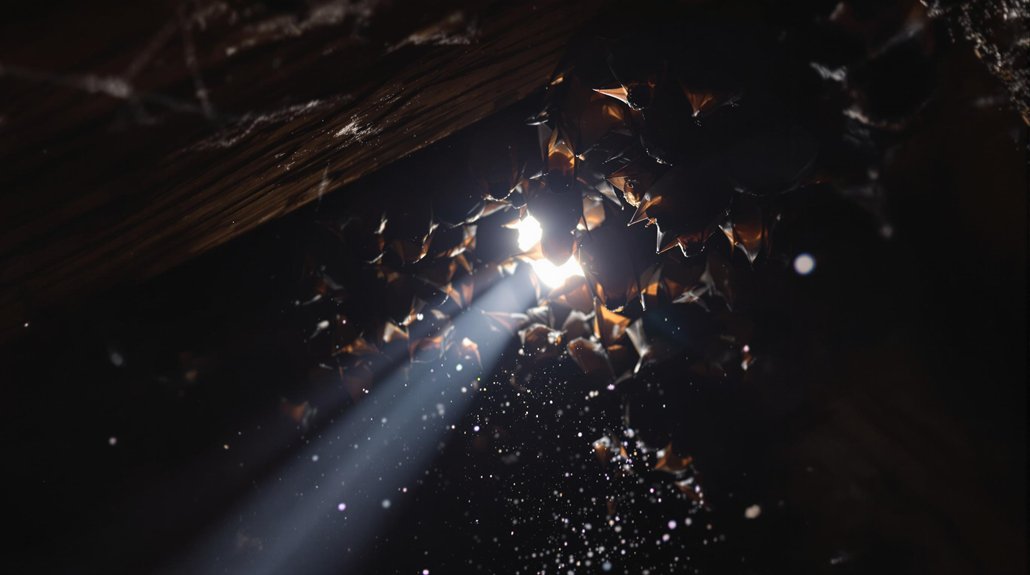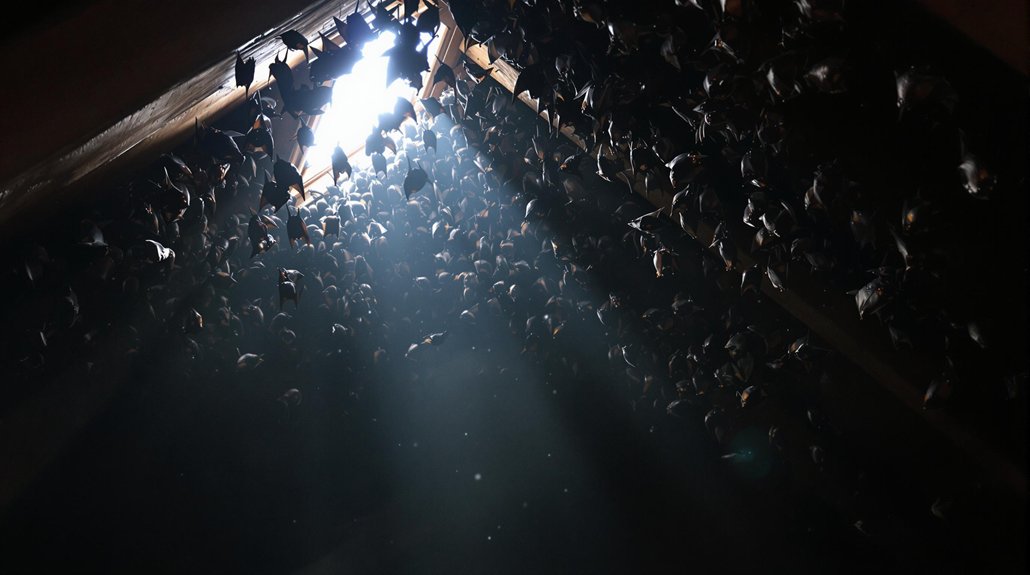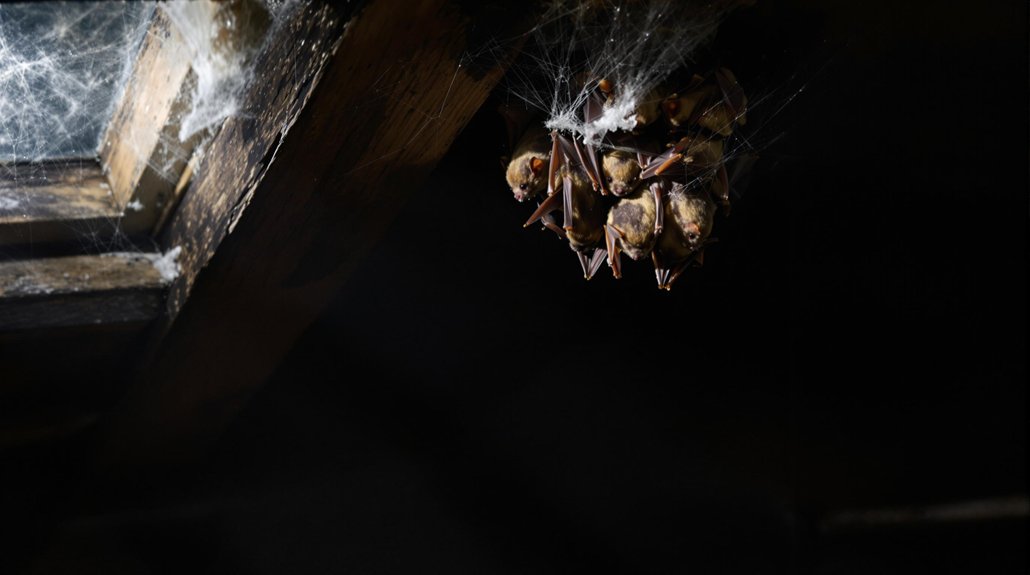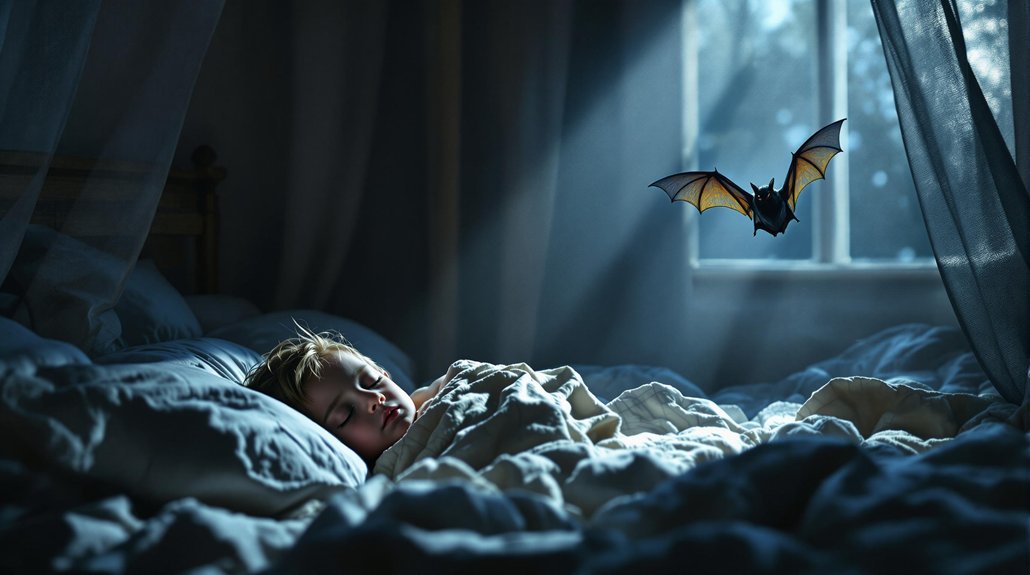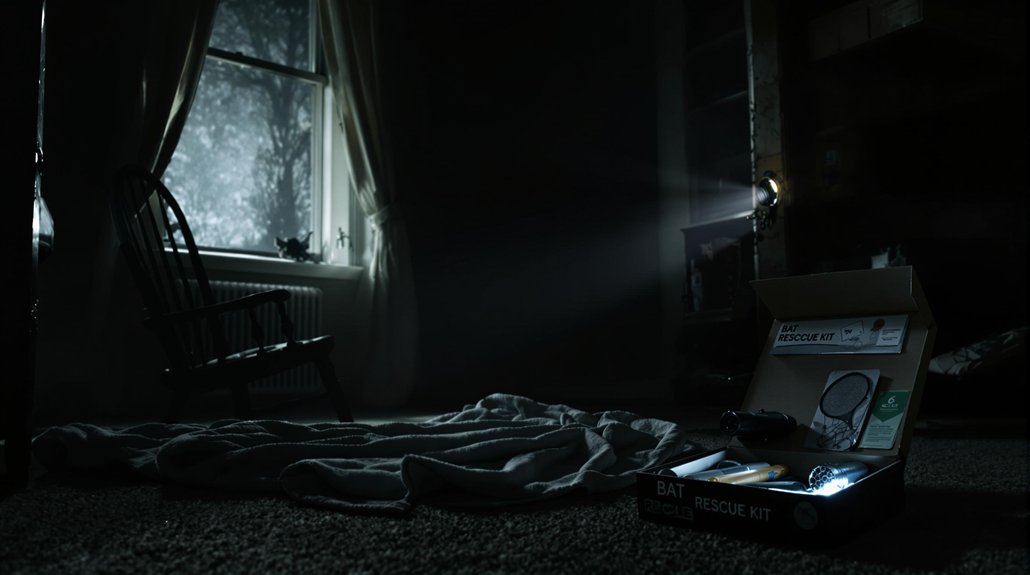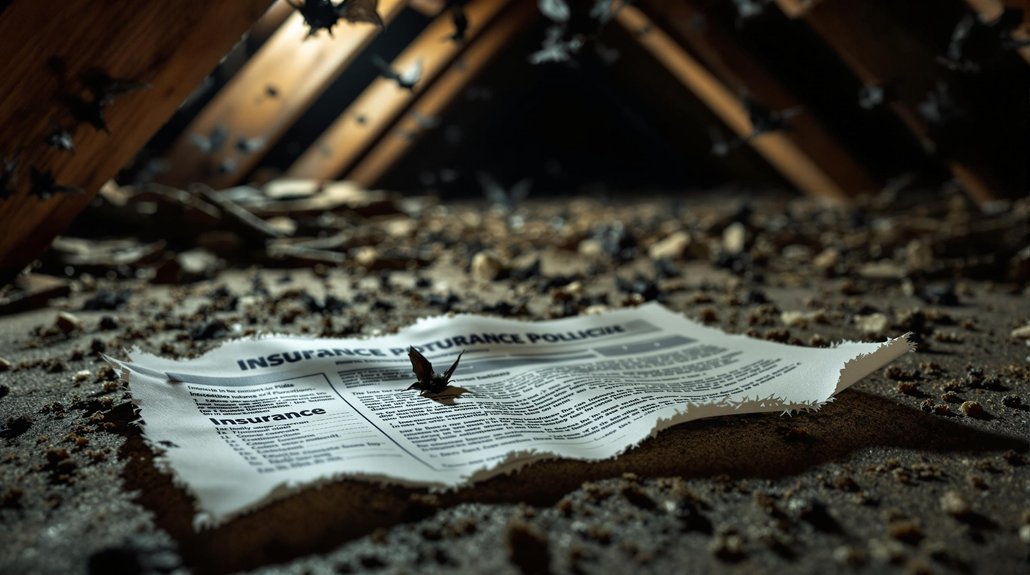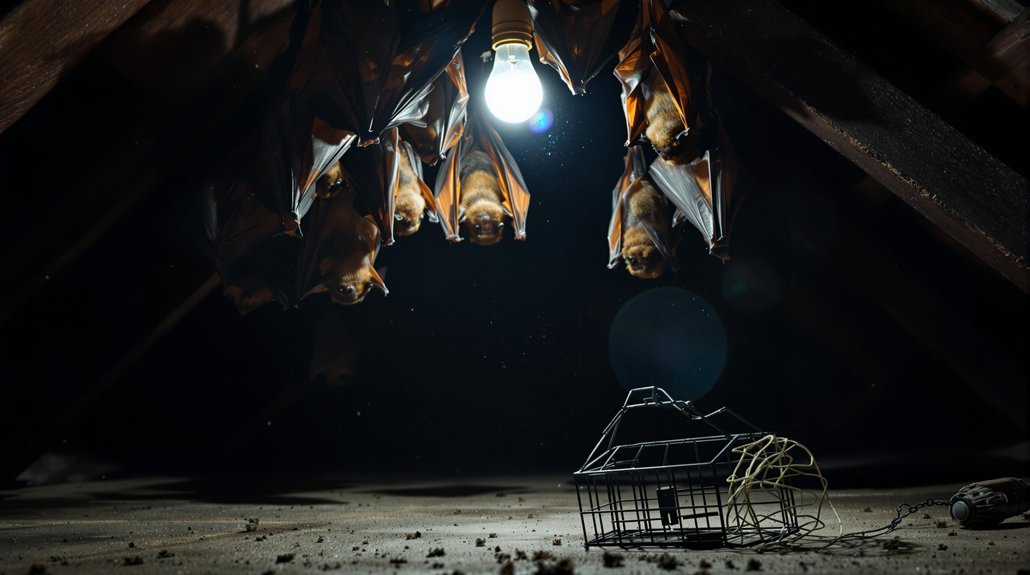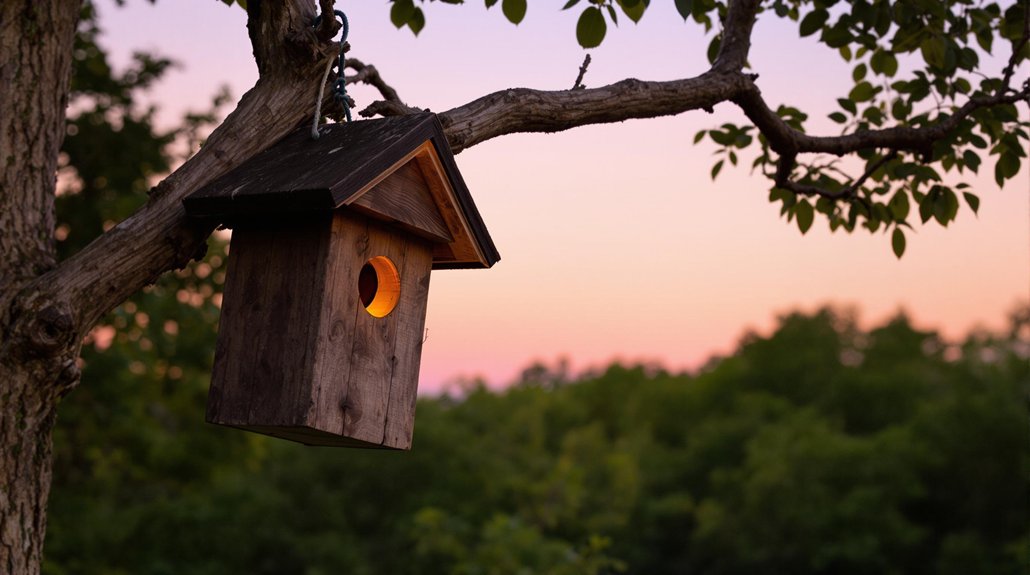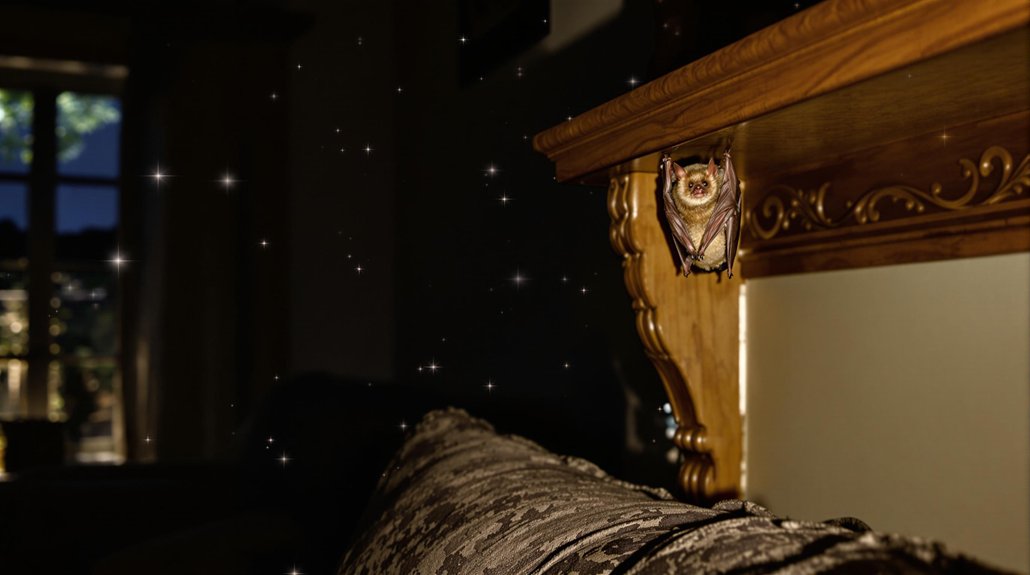Bats in Southwest Michigan are most active during the warmer months, with peak activity occurring from May to August. In early spring, they emerge from hibernation and begin foraging for insects. As the weather warms, their activity increases markedly, especially at dusk and throughout the night. This period is essential for bats as they hunt and contribute to pest control in the ecosystem. As summer ends and the temperatures cool in late August and September, their activity starts to decline. Exploring more about these fascinating creatures will reveal even more insights into their habits and habitats.
Key Article Highlights
- Bats in Southwest Michigan are most active during late spring and summer, particularly from May to August.
- Their emergence from hibernation occurs in early spring, marking the start of increased activity.
- Peak activity levels are observed in the warmer months when insect populations are abundant.
- Activity declines in late August and September as bats prepare for winter.
- Migration periods in late summer and early fall can also see increased bat movement.
Overview of Bat Species
What makes bats such fascinating creatures in Southwest Michigan? One reason is the variety of bat species that call this area home. There are several key species, including the little brown bat, big brown bat, and the endangered northern long-eared bat. Each species has unique characteristics, making them intriguing to study and observe.
Bats play significant ecological roles in the environment. They are natural pest controllers, consuming vast quantities of insects each night. For example, a single bat can eat thousands of mosquitoes or beetles in just a few hours, helping to maintain a balanced ecosystem. Additionally, some bat species are essential for pollination and seed dispersal, which supports plant diversity.
Understanding the different bat species in Southwest Michigan is fundamental for conservation efforts. Their populations are facing threats from habitat loss and diseases like white-nose syndrome. Protecting these bats not only helps maintain their ecological roles but also contributes to the overall health of our environment. As we learn more about these fascinating creatures, we can better appreciate their importance and advocate for their preservation in our local ecosystems.
Seasonal Activity Patterns
Bats in Southwest Michigan exhibit distinct seasonal activity patterns that align with the changes in their environment. During the warmer months, particularly in late spring and summer, bats become highly active. They take advantage of the plentiful food supply, mainly insects, and showcase their nocturnal behaviors by hunting at dusk and throughout the night. This period is significant for feeding and breeding, as female bats often give birth in late June.
As temperatures begin to drop in the fall, bats start preparing for winter. They exhibit remarkable hibernation habits, seeking out suitable roosts in caves, old buildings, or tree hollows. By late October, many bats have already entered a state of torpor, slowing their metabolism to conserve energy. This hibernation is essential for their survival, as food becomes scarce during the cold months.
Throughout winter, these bats remain inactive, waking occasionally to drink or move to a slightly warmer location. Understanding these seasonal patterns is important for conservation efforts, as it helps to determine key habitats that need protection during both active and hibernation periods.
Peak Months for Bat Activity
In Southwest Michigan, bat activity peaks during the warmer months, particularly from late spring to early fall. Temperature plays a big role in their behavior, influencing breeding and migration patterns. Understanding these peak months can help us appreciate the important role bats play in our ecosystem.
Seasonal Activity Patterns
Emerging from hibernation in early spring, bat activity in Southwest Michigan begins to peak during the late spring and summer months. As temperatures warm up, bats become more active, breaking out of their hibernation habits and taking to the skies. This period typically spans from May to August, when the balance of warm nights and abundant insect populations supports their nocturnal behavior.
During this peak season, bats are most often seen foraging for food at dusk and throughout the night. They rely on their echolocation skills to navigate and hunt insects, making them essential players in the ecosystem. As summer progresses, various species of bats, including little brown bats and big brown bats, can be spotted darting through the air, showcasing their agility and speed.
As summer winds down, bat activity begins to decline in late August and September, as they prepare for the colder months ahead. Understanding these seasonal activity patterns is important for conserving bat populations and appreciating their role in maintaining the ecological balance in Southwest Michigan. Observing these patterns helps us recognize the importance of preserving their habitats and promoting healthy ecosystems.
Temperature Influence
During the months of May through August, temperature plays a significant role in determining bat activity in Southwest Michigan. As the weather warms, bats become more active, taking advantage of the abundant insect populations that thrive in these conditions. Generally, ideal temperatures encourage bats to hunt and forage more frequently, leading to heightened activity levels.
However, temperature extremes can have a negative impact on bat behavior. For instance, particularly high temperatures can lead to heat stress, causing bats to seek cooler roosting spots or remain inactive during the hottest parts of the day. Similarly, sudden temperature fluctuations, such as unseasonably cool nights, can disrupt their feeding patterns and overall activity.
In contrast, mild evenings during the summer months create perfect conditions for bats to emerge and hunt. They are most active during twilight hours when the temperature is comfortable, allowing them to efficiently catch insects. Hence, understanding the influence of temperature on bat activity is essential for anyone interested in observing these fascinating creatures in Southwest Michigan. Monitoring local weather patterns can provide insights into the best times for bat watching.
Breeding and Migration
Bat activity in Southwest Michigan is not only influenced by temperature but also greatly shaped by their breeding and migration patterns. During the warmer months, particularly from June to August, bats are most active as they engage in their breeding habits. This period is vital for mating and raising young, leading to increased activity as bats hunt for food to support their offspring.
As summer draws to a close, bats begin to prepare for migration. Many species, like the little brown bat, follow specific migration routes to find warmer climates for the winter. This migration typically occurs between September and October, marking a decline in local bat activity.
Understanding these patterns is essential for conservation efforts and for anyone interested in observing bats. By knowing when bats are breeding and migrating, enthusiasts can plan their activities, such as bat watching or research, more effectively. In conclusion, the peak months for bat activity in Southwest Michigan align closely with their breeding and migration, making late spring to early fall the best times to observe these fascinating creatures in action.
Factors Influencing Bat Behavior
In the diverse ecosystems of Southwest Michigan, various factors considerably influence bat behavior. One of the most critical elements is habitat preferences. Bats often select roosting sites that offer protection from predators and harsh weather. They tend to favor areas with abundant tree cover, cliffs, and buildings, which provide suitable environments for resting during the day.
Food availability is another significant factor. Bats primarily feed on insects, and their foraging patterns are closely linked to the abundance of these food sources. Seasonal changes in insect populations can greatly impact bat activity levels.
The table below summarizes some key factors influencing bat behavior:
| Factor | Influence on Behavior |
|---|---|
| Habitat Preferences | Preferred roosting sites and safety |
| Food Availability | Foraging patterns based on insect abundance |
| Weather Conditions | Activity levels during rain or cold snaps |
| Time of Day | Nocturnal feeding habits |
| Seasonal Changes | Migration and breeding patterns |
Understanding these factors helps us appreciate the complex dynamics of bat behavior in Southwest Michigan, leading to more effective conservation efforts.
Best Locations for Observation
Great opportunities for bat observation can be found in various locations throughout Southwest Michigan. These areas provide ideal habitats that support diverse bat populations. When planning your bat watching adventures, consider these top spots:
- Parks and Nature Reserves: Locations like the Warren Dunes State Park or the Hart-Montague Trail State Park offer natural environments where bats thrive.
- Wetlands and Marshes: Areas such as the Allegan State Game Area feature water bodies that attract insects, making them great for bat activity.
- Rural Areas and Farms: Open fields and farmland create spaces for bats to hunt at dusk, especially near ponds or streams.
- Historic Sites: Many historic structures have roosting spots for bats. Exploring these sites can provide unique bat watching opportunities.
Tips for Spotting Bats
When observing bats, knowing the right techniques can enhance your experience considerably. Bat watching can be an exciting and rewarding activity, especially in Southwest Michigan, where these creatures thrive. To spot bats effectively, it's crucial to understand their nocturnal habits. Bats are most active during dusk and dawn, so plan your observation times accordingly.
Choose a quiet location near water sources, like lakes or rivers, as bats often hunt for insects near these areas. Bring along binoculars to get a closer view without disturbing them. You might also want to use a bat detector, which can help you hear their echolocation calls, giving you clues about their presence.
Patience is key. It may take time to spot them, so stay still and quiet. Observing their flight patterns can be fascinating; look for swooping and diving movements as they catch insects. Finally, consider joining local bat watching groups or guided tours. These resources can provide valuable tips and insights, making your experience more enjoyable and educational. With these tips, you're well on your way to becoming a skilled observer of Michigan's fascinating bats.
Frequently Asked Questions
Do Bats Migrate From Southwest Michigan to Warmer Areas?
Like whispers in the night, bats engage in migration from Southwest Michigan, seeking warmer climates during colder months. This natural phenomenon is vital for their survival, ensuring access to abundant food and suitable habitats.
What Are Common Predators of Bats in This Region?
Bat predators in Southwest Michigan include owls, hawks, raccoons, and snakes. Understanding these threats is crucial for bat conservation efforts, as protecting bats from their natural predators helps maintain healthy ecosystems and supports biodiversity in the region.
How Do Climate Changes Affect Bat Populations?
Climate impact notably affects bat populations, leading to altered habitat conditions and food availability. These changes influence population trends, potentially causing declines in certain species and disrupting ecological balance within their environments. Understanding these effects is essential.
Are Bats Nocturnal Year-Round or Only During Certain Months?
Bats are the night's silent aviators, exhibiting nocturnal behavior year-round. However, their seasonal activity fluctuates with climate and food availability, influencing their patterns of foraging and roosting throughout the changing months.
Can I Attract Bats to My Backyard?
To attract bats to your backyard, consider installing bat houses that mimic their natural habitats. Placing them in quiet, dark areas can encourage bats to roost, providing them a safe space while benefiting your garden.

